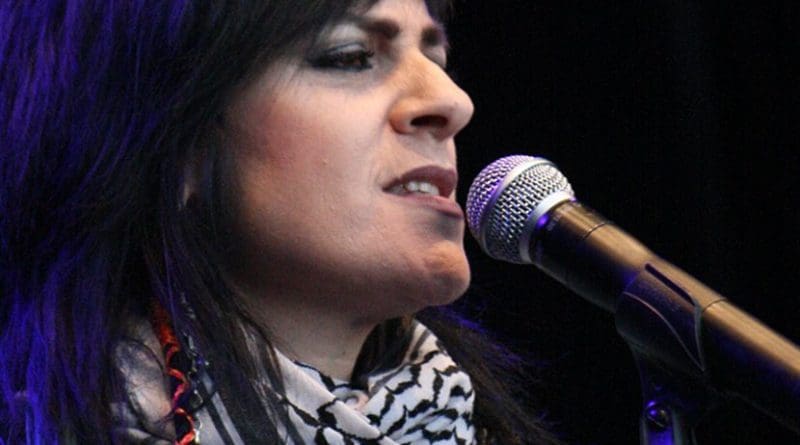Embrace Palestinian Resistance To Keep West’s Cultural Hegemony At Bay
By Ramzy Baroud
Rim Banna, a famous Palestinian singer who translated Palestine’s most moving poetry into song, passed away last March at the age of 51. Banna captured the struggle for Palestinian freedom in the most dignified and melodious ways. If we could imagine angels singing, they would sound like her.
When Banna died, all Palestinians mourned her death. Although a few international outlets carried the news of her passing at a relatively young age, her succumbing to cancer did not receive much coverage or discussion. Sadly, the death of a Palestinian icon of cultural resistance who had inspired a whole generation, starting with the First Intifada in 1987, hardly registered as an event worthy of remembrance and reflection, even among those who purport to champion the Palestinian cause.
Compare her to Madonna, an “artiste” who has stood for self-aggrandizement, personal fame and money-making. The latter has championed the most debased moral values, utilizing cheap entertainment while catering to the lowest common denominator to remain relevant in the music world for as long as possible.
Where Banna had a cause, Madonna has none. And, as Banna symbolized cultural resistance, Madonna symbolizes globalized cultural hegemony — in this case, the imposition of consumerist Western cultures on the rest of the world.
Cultural hegemony defines the US and other Western cultures’ relationship with the rest of the world. It is not culture as in the collective intellectual and artistic achievements of these societies, but as a set of ideological and cultural tools used by the ruling classes to maintain domination over the disadvantaged, colonized and oppressed.
Madonna, along with Michael Jordan, the Beatles and Coca-Cola, represent far more than mere performers and fizzy drinks; they also serve as tools to secure cultural, thus economic and political, dominance. The fact that, in some cities around the world, especially in the Southern hemisphere, Coca-Cola “flows more freely than water” speaks volumes about the economic toll and political dimension of cultural hegemony.
This issue becomes critical when Madonna decides to perform in Israel, as she has done repeatedly in the past, as part of the Eurovision Song Contest. Knowing who she is and what she stands for, her decision should not come as a surprise — after all, in her September 2009 Tel Aviv concert, she sang while wrapped in an Israeli flag.
Of course, it is essential that artistes of her caliber and the contestants representing 41 different countries are reminded of their moral responsibilities toward occupied and oppressed Palestinians. It is also important that Israel is confronted regarding its unrelenting efforts to mask its apartheid and war crimes in Palestine.
Indeed, the whitewashing of Israeli human rights violations using art — also known as “art-washing” — should not be allowed to continue while Gaza is under siege and Palestinian children are shot and killed almost daily, without remorse and without legal accountability.
This is why such artistic events are important for the Israeli government and society. Israel has used Eurovision as a distraction from the blood and gore that has been in evidence not far from the Tel Aviv venue. Those who labored to ensure the success of the event, knowing full well how Israel is using it as an opportunity to normalize its war against Palestinians, should be thoroughly ashamed of themselves.
But, on the other hand, should we be the least bit surprised? Aren’t music events such as Eurovision at the heart of the Western-centric globalization scheme of cultural hegemony, whose sole purpose is to enforce a capitalist view of the world where Western culture is consumed as a commodity, no different from a McDonald’s sandwich or a pair of Levi jeans?
Calling on a 60-year-old Madonna to refrain from entertaining apartheid Israel can be considered beneficial as a media strategy, for it helped highlight, although only momentarily, an issue that would have otherwise been absent from news headlines. However, by placing so much focus on Madonna, and whatever human rights values she supposedly stands for, we also take the risk of inadvertently validating her and the consumerist values she represents. Moreover, in this Madonna-driven trajectory, we are also neglecting Palestine’s cultural resistance, the core drive behind Palestinian “sumud” (steadfastness) over the course of a century.
While it is important that we keep the pressure on those who engage and validate Israel politically, economically and culturally, these efforts should be secondary to embracing Palestine’s culture of resistance. Behaving as if Madonna’s stage shenanigans represent true culture, while ignoring Palestinian culture altogether, is similar to academics addressing decolonization from the point of view of the colonizer, not the colonized. The truth is, nations cannot truly rid themselves of the colonial mindset without having their narratives take center stage in terms of politics, culture and every other aspect of knowledge.
“The intellectual’s error consists in believing that one can know without understanding and, even more, without feeling and being impassioned,” wrote Italian anti-fascist intellectual Antonio Gramsci. This entails the intellectual and the artist feeling “the elementary passions of the people, understanding them and, therefore, explaining and justifying them.”
The truth is that appealing to Madonna’s moral sense without immersing ourselves passionately in the art of Banna will, in the long run, do Palestinians no good. Only embracing Palestine’s culture of resistance will, ultimately, keep the self-serving, hegemonic and cheap cultural messages of the Madonnas of this world at bay.

